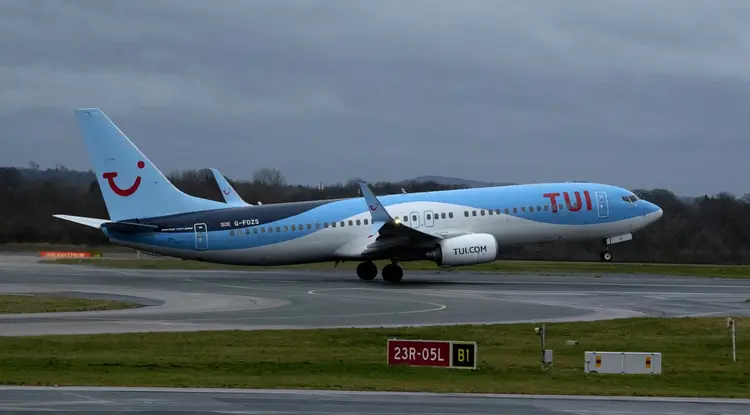Pilots’ blunder forces TUI flight to abort in mid-air

Subscribe For Free Morning News Updates!
Subscribe For Our Free Morning Headlines!
Subscribe To Our Free Morning Headlines!
I would appreciate receiving emails about promotions, events, and news from The Independent. Please review our privacy policy.
An investigation revealed that a TUI aircraft carrying 193 passengers was unable to maintain cabin pressure because crew members were unaware that a switch had been turned off by maintenance staff. As a result, the pilots had to cancel the flight.
On October 17 of last year, a Boeing 737-8K5 departed from Manchester Airport heading for Kos, Greece. However, it barely reached northern Lincolnshire before needing to turn back.
The 193 individuals aboard, which included six crew members and 187 passengers, faced a potential risk of oxygen shortage due to a significant mistake made by both pilots.
The Air Accidents Investigation Branch discovered that the pilots overlooked the fact that maintenance staff had left the switches for the engine air bleed systems turned off. As a result, the aircraft couldn't maintain cabin pressure, triggering a warning light for cabin altitude.
According to the report, the warning signal lasted for 43 minutes. The aircraft made its way back to Manchester without any reported injuries. However, investigators mentioned that both the crew and the passengers faced the danger of hypoxia.
Hypoxia occurs when there is insufficient oxygen in the body. This condition can cause confusion, trouble with breathing, and may ultimately result in someone fainting.
Although the chances of losing consciousness were low at the altitude where the issue was identified, those risks would have increased had the aircraft continued to ascend.
Investigators discovered that a shortage of oxygen may have played a role in the crew's poor judgment.
The report indicates that both pilots believed the bleed switch was activated before takeoff. However, as the aircraft climbed past 15,000 feet, the altitude warning light illuminated.
The commander mentioned, "We quickly realized that both engine bleeds were turned off, so we switched them back on, and that fixed the issue." The crew didn’t wear oxygen masks and carried on as usual until they detected a problem with the right air conditioning unit.
The commander halted the ascent and consulted with ground officials, ultimately deciding to head back to Manchester Airport.
The report indicated that the team failed to carry out the required drills outlined in the Quick Reaction Handbook when the cabin altitude alert was triggered.
Neither pilot was initially planned to fly this route; they were both on standby from 3 a.m. that morning. The captain received a call on his phone at 1 a.m., informing him that he had been assigned to operate the flight from Manchester to Kos.
The co-pilot got a call at 2:30 AM, informing them that they needed to report for duty by 4:30 AM.













































